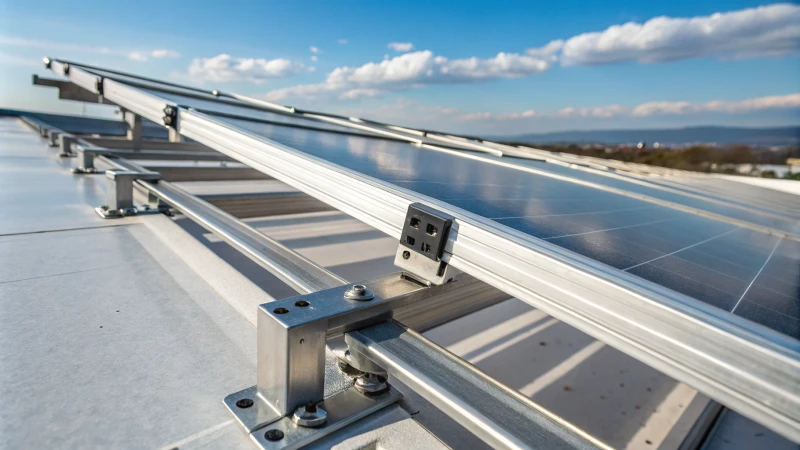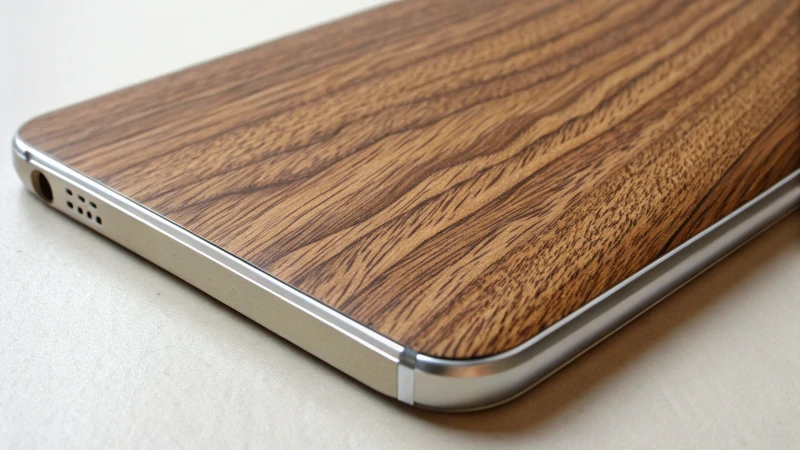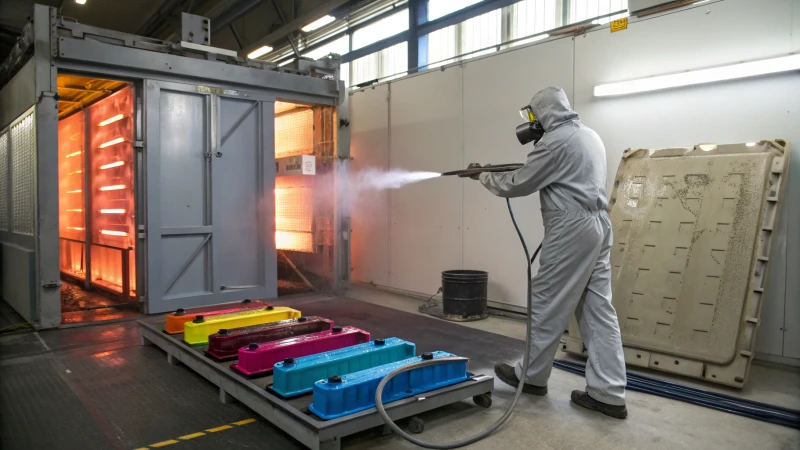Aluminum Extrusion Solutions for Solar Mounting Systems

Aluminum extrusions are becoming indispensable in the world of solar energy, especially in mounting systems.
Aluminum extrusions are ideal for solar mounting systems due to their lightweight, durability, and resistance to corrosion. These attributes ensure easy installation, long-term reliability, and efficient energy production, making them a perfect fit for outdoor solar panel applications.
While aluminum extrusions provide an immediate answer to many challenges in solar installations, there’s much more to uncover about their benefits. Understanding these can help you make informed decisions for your solar energy needs.
Aluminum extrusions are heavier than steel.False
Aluminum is lighter than steel, making it ideal for solar mounts.
Aluminum resists corrosion better than steel.True
Aluminum naturally forms a protective oxide layer, resisting corrosion.
How Do Aluminum Extrusions Enhance Solar Panel Stability?
Aluminum extrusions play a crucial role in stabilizing solar panels by offering lightweight, durable, and corrosion-resistant properties. These characteristics ensure that solar panels remain efficient and secure in various environmental conditions.
Aluminum extrusions enhance solar panel stability by providing a lightweight yet strong framework that resists corrosion and adapts to various installations. This ensures panels remain secure, efficient, and long-lasting.

Key Benefits of Aluminum Extrusions in Solar Panel Systems
Aluminum extrusions offer a host of benefits that significantly contribute to the stability and efficiency of solar panels. Their unique properties make them ideal for solar applications.
| Benefits | Details |
|---|---|
| Lightweight | Easy to handle and install, reducing labor costs and time. |
| Durability | Resists weather extremes, maintaining structural integrity over time. |
| Corrosion Resistance | Ensures longevity, especially in coastal or humid environments. |
| Customizability | Allows for tailored designs to fit specific project needs and space constraints. |
Structural Support and Strength
The high strength-to-weight ratio of aluminum extrusions provides robust support for solar panels, ensuring that they withstand environmental stresses like wind or snow. This structural capability prevents any sagging or deformation over time, which could compromise the system’s efficiency.
Adaptability in Design
One of the standout features of aluminum extrusions is their customizability. They can be designed to suit various installation types, from rooftop to ground-mounted systems. This adaptability allows for optimal space utilization and ensures panels are positioned for maximum sunlight exposure.
- Versatile Mounting Options: Supports diverse panel sizes and configurations.
- Adjustable Angles: Facilitates precise alignment for peak energy capture.
Environmental and Economic Impact
Aluminum is 100% recyclable, making it an eco-friendly choice that aligns with the sustainability goals of solar projects. Additionally, its recyclability translates into cost savings over the lifespan of the installation, as fewer resources are needed for replacement or maintenance.
- Reduced Environmental Footprint: Utilizing recycled materials contributes to lower carbon emissions.
- Cost-Effective Maintenance: Fewer repairs needed due to its innate durability.
Aluminum extrusions are heavier than steel frames.False
Aluminum extrusions are lightweight compared to steel, aiding in ease of installation.
Aluminum is 100% recyclable and eco-friendly.True
Aluminum's recyclability reduces environmental impact and aligns with sustainability goals.
What Are the Cost Benefits of Using Aluminum in Solar Installations?
Aluminum offers significant cost advantages for solar installations, combining affordability with superior performance. Its benefits range from reduced installation expenses to long-term savings due to its durability and recyclability.
Aluminum reduces costs in solar installations by being lightweight, which cuts down transportation and labor expenses. Its durability minimizes maintenance, while recyclability supports sustainability and cost-effectiveness.

Lightweight Nature Reduces Costs
One of the primary cost benefits of using aluminum in solar installations is its lightweight nature. Unlike heavier materials like steel, aluminum requires less energy to transport, reducing shipping costs significantly. This not only lowers initial expenditures but also simplifies the logistics of large-scale solar projects.
Cost Breakdown:
- Transportation Savings: Lower fuel and handling costs.
- Labor Reduction: Easier and faster installation reduces labor hours.
Durability Minimizes Maintenance
Aluminum’s natural corrosion resistance means that it does not require frequent maintenance. When used in solar mounting systems, this characteristic can lead to substantial savings over the lifespan of the installation. With fewer repairs and replacements needed, project budgets are preserved.
Maintenance Savings:
- Longer Lifespan: Withstands harsh environmental conditions without degrading.
- Lower Repair Costs: Reduces the frequency and cost of maintenance work.
Recyclability Supports Sustainability
Aluminum is 100% recyclable, making it an environmentally friendly choice. This aspect contributes to the overall sustainability of solar projects. Moreover, recycling aluminum consumes significantly less energy compared to producing new metal, resulting in cost savings for manufacturers and lower environmental impact.
| Feature | Benefits |
|---|---|
| Lightweight | Cuts shipping and labor costs |
| Durable | Minimizes maintenance expenses |
| Recyclable | Reduces production energy and environmental footprint |
High Strength-to-Weight Ratio Ensures Reliability
Despite being lightweight, aluminum’s high strength-to-weight ratio ensures robust structural support for solar panels. This reliability prevents system failures, protecting against costly replacements or system downtimes.
Reliability Insights:
- Strong Support: Provides stable mounting for heavy panels.
- Weather Resistance: Withstands wind, snow, and other stresses.
By understanding these cost benefits, stakeholders can make informed decisions about the use of aluminum in their solar projects, balancing initial investments with long-term economic advantages. This approach not only optimizes financial outcomes but also aligns with sustainability goals.
Aluminum reduces solar installation shipping costs.True
Aluminum's lightweight nature decreases transportation energy and costs.
Aluminum requires frequent maintenance in solar systems.False
Aluminum's corrosion resistance minimizes the need for frequent maintenance.
Can Aluminum Extrusions Be Customized for Unique Solar Setups?
Aluminum extrusions offer a versatile solution for solar setups, allowing for tailored designs to meet unique project needs. Discover how these customizations enhance efficiency and aesthetics in solar installations.
Yes, aluminum extrusions can be customized for unique solar setups. They provide flexibility in design, allowing adaptation to specific configurations and environmental conditions, enhancing both efficiency and visual appeal of solar installations.

The Flexibility of Aluminum Extrusions
Aluminum’s malleability enables the creation of diverse shapes and sizes, making it ideal for solar setups. Whether you need to fit a solar array on a sloped roof or a shaded canopy, custom extrusions can be precisely tailored.
Custom Profiles for Enhanced Performance
Custom profiles enhance performance by ensuring the mounting system matches the specific angles and layouts required. For instance, in areas prone to high winds, reinforced extrusions ensure stability.
| Feature | Benefit |
|---|---|
| Custom Angles | Optimal sun exposure |
| Reinforced Sections | Increased durability |
| Anodized Finishes | Long-term corrosion resistance |
Environmental Considerations
For eco-conscious projects, aluminum extrusions can be crafted using recycled materials. This aligns with sustainable practices, reducing the carbon footprint of solar installations.
Aesthetic and Practical Benefits
Custom extrusions not only offer practical benefits but also aesthetic ones. With finishes like powder coating, the components can blend seamlessly into various environments, enhancing visual appeal while maintaining functionality.
Consider a scenario where bespoke designs are needed to accommodate additional panel weight or to integrate with existing structures. The adaptability of aluminum ensures that such modifications are not just possible but efficient.
Cost Implications
While customization might seem costly upfront, it can lead to savings by maximizing energy efficiency and minimizing maintenance needs over time. A well-designed system reduces the likelihood of wear, resulting in fewer replacements and repairs.
In summary, customizing aluminum extrusions for solar setups offers a strategic approach to optimizing energy generation and enhancing overall system aesthetics and durability. This adaptability ensures that unique environmental and architectural requirements are met efficiently. Explore more about custom solutions for your next solar project.
Aluminum extrusions can be customized for solar setups.True
Aluminum's malleability allows for tailored designs to fit unique solar projects.
Custom aluminum profiles increase solar system costs significantly.False
While upfront costs may rise, long-term savings and efficiency offset expenses.
Why Is Corrosion Resistance Important in Solar Mounting?
Corrosion resistance is crucial for solar mounting systems, ensuring their durability and performance. Without it, the structural integrity of solar installations could be compromised, leading to costly repairs or replacements.
Corrosion resistance in solar mounting systems is vital as it protects against environmental degradation. This ensures the longevity and reliability of solar panels, reducing maintenance costs and enhancing energy efficiency.

Understanding Corrosion in Solar Mounting
Solar mounting systems are constantly exposed to environmental elements such as rain, humidity, and UV rays. These factors can cause corrosion, which is the gradual deterioration of materials due to chemical reactions with the environment.
- Material Degradation: Corrosion weakens the mounting structure, risking the safety and efficiency of solar panels.
- Environmental Impact: Coastal areas experience higher corrosion rates due to salty air, increasing the need for corrosion-resistant materials.
The Role of Aluminum in Solar Mounting
Aluminum is a popular choice for solar racking due to its natural corrosion resistance. When anodized or powder-coated, its resistance is further enhanced, making it ideal for long-term outdoor use.
- Durability: Aluminum withstands harsh weather without rusting.
- Cost Efficiency: It reduces maintenance needs, lowering operational costs over time.
How Corrosion Resistance Enhances System Longevity
Corrosion-resistant materials help maintain the structural integrity of solar panels, ensuring they remain functional and efficient for decades. This not only saves on repair costs but also enhances energy production.
| Factor | Impact on System |
|---|---|
| Salt Exposure | Increased degradation |
| High Humidity | Accelerated corrosion |
| UV Radiation | Material weakening |
Choosing the Right Materials for Durability
When selecting materials for solar mounting systems, consider those with proven corrosion resistance properties. Investing in high-quality materials upfront can prevent future issues and extend the system’s life.
- Aluminum vs. Steel: Aluminum offers better resistance compared to traditional steel, which may require additional coatings or treatments to prevent rust.
- Recyclability: Besides being durable, aluminum is 100% recyclable, aligning with sustainability goals.
Aluminum is naturally corrosion-resistant.True
Aluminum forms a protective oxide layer, resisting corrosion.
Steel offers better corrosion resistance than aluminum.False
Aluminum has superior natural corrosion resistance compared to steel.
How Does Aluminum Contribute to Sustainable Solar Energy Solutions?
Aluminum is revolutionizing solar energy by enhancing efficiency and sustainability. From lightweight structures to recyclable materials, its benefits are reshaping renewable energy landscapes.
Aluminum’s contribution to sustainable solar energy solutions lies in its recyclability, lightweight properties, and corrosion resistance. These features make it ideal for solar panel structures, improving efficiency and reducing environmental impact.

Lightweight and Durable Structures
One of the key contributions of aluminum to solar energy is its lightweight yet durable nature. Aluminum’s low density reduces transportation costs and simplifies installation processes for solar panel mounting systems. Its strength-to-weight ratio ensures structural integrity, even under heavy loads.
| Feature | Benefit |
|---|---|
| Lightweight | Easy handling and lower transportation costs |
| Durable | Long-lasting support with minimal maintenance |
Corrosion Resistance
Aluminum’s natural resistance to corrosion is crucial for solar installations exposed to harsh weather. This quality prolongs the life of solar mounting systems, ensuring reliable energy generation over time. Anodized or powder-coated aluminum enhances this resistance, making it suitable for varied climates.
Customizable Designs
Through aluminum extrusion processes, manufacturers can create custom profiles that accommodate different solar panel configurations. This versatility allows for tailored solutions in residential rooftops or expansive solar farms. It enables flexibility in design without compromising efficiency.
Efficient Heat Dissipation
Aluminum’s thermal conductivity helps dissipate excess heat from solar panels, maintaining optimal operational temperatures. This prevents overheating, which can degrade performance, thus enhancing the efficiency and lifespan of the panels.
Environmental Sustainability
Aluminum is 100% recyclable, making it a champion of sustainability in the solar sector. Recycled aluminum requires significantly less energy to produce than new material, minimizing its carbon footprint. This aligns with the eco-friendly goals of modern solar energy projects, promoting a circular economy model.
| Sustainability Feature | Impact |
|---|---|
| Recyclability | Reduces environmental footprint |
| Energy efficiency | Lowers production energy needs |
Incorporating aluminum into solar energy solutions is a significant step towards achieving global sustainability goals while enhancing the effectiveness and longevity of renewable energy systems. Understanding these benefits can lead to more informed decisions when selecting materials for solar projects. Explore more about how these features drive innovation in sustainable energy technologies.
Aluminum reduces solar panel transportation costs.True
Aluminum's low density makes it lightweight, reducing transportation costs.
Recycled aluminum requires more energy than new material.False
Recycled aluminum requires less energy to produce than new material.
Conclusion
Aluminum extrusions enhance solar mounting systems with their lightweight, durable, and corrosion-resistant properties, ensuring efficient installation, long-term reliability, and environmental sustainability in solar energy applications.


